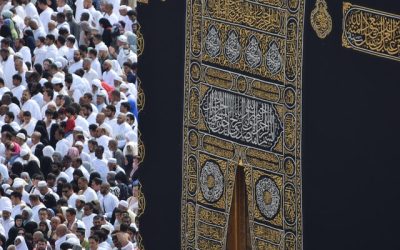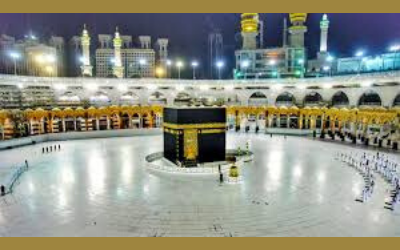A. It will be permissible provided your creditors sincerely do not mind you paying them at a later date and one feels reasonably confident that you could make arrangements to pay out the debts in good time.
Q. Can an adopted son act as a wali for his foster mother and/ or foster sister?
A. No. An adopted son is not regarded as a mahram (one with whom Nikaah is Haraam), hence he cannot be used as a wali for travelling. In fact all the rules of Hijaab and Pardah have to be enforces between them.
Q. My husband and I have already performed one Haj and would like to go, Insha-Allah, for Umra. We would like to take our daughters who are both baligh, with us, Insha-Allah. Would Haj then become compulsory on them even though we paid the cost of the Umrah?
A. Haj will not become fard on them since they are not wealthy. It would be preferable for you to postpone their trip and allow them to accumulate wealth enabling them to accomplish their fard haj.
Q. Can a woman wear white clothing for her Ihraam?
A. It is not masnoon for women to wear white clothing for her Ihraam.
Q. Can I pay for my father and mother to go for Hajj? I've already made my Hajj.
A. Yes, one could pay for their Fardh Hajj and their Hajj will be discharged.
Q. Can I take my wife's sister for Haj? (I am still married to her)
A. No, because you are not her Mahram, you will not be able to take her for Haj.
Q. Can my wife go for hajj with my stepfather? My real father passed away and my mother remarried?
A. No. He is not Mahram to her.
Q. I will experiencing menses on the day of wearing Ihraam for Haj
A. These two rakaats are Sunnat, hence it will not affect your Ihraam in any way especially when it is omitted due to a valid excuse.
Q: Regarding the sequence and status of the Hajj rituals to be offered on the sacrificial day of 10th Zul Hijjah. Is is permissible to make Halq (shaving the hair) before Zabah (sacrifice)?
A: A Mutamatti and Qaarin carries out four rituals on this day, viz. Rami (pelting the shaytaan), Damm ul Shukr (sacrifice), Halaq (shaving the hair) and Tawaaf ul Ziyaarah. Damm ul Shukr is not Waajib on a Munfarid bi, Hajj, but Mustahab.
The Ulama have categorically stated that it is Waajib to observe sequence between the first three. i.e Rami, Damm ul Shukr and Halaq. However, observing sequence between these three and Tawaf ul Ziyaarah is sunnah. In other words, whilst maintaining the order of sequence between these three by first offering Rami then Damm ul Shukr and thereafter Halaq it will be permissible to perform the Tawaaf ul Ziyaarah before the Rami or Dumm ul Shukr or Halq. Although changing this latter sequence between the first three and Tawaaf ul Ziyaarah is permissible it will be Makrooh (with no penalty) to do so without any valid reason. Therefore, one should at all times endeavour to adhere to the proper sequence of Hajj. Failure in observing sequence to any of these three (for a Mutamatti and Qaarin) shall necessitate a penalty of one Damm. If a Mutamatti or Qaarin makes Halaq before Damm ul Shukr then two animals (sheep) have to be sacrificed ; one as Damm ul Shukr for his Tamattu / Qiraan and the other as a penalty for changing the sequence. There is no Damm upon a mufrid who offers Damm ul Shukr after Halq or before Rami, as Damm ul Shukr is not Waajib upon him. However, a Mufrid should observe the Waajib sequence between Rami and Halaq.
Q: Can a woman accompany her sister and brother in-law on Umrah or Haj ?
A: The obligation of Hajj does not apply to a woman who has no Mahram or husband to accompany her for her Hajj. Rasoolullah Sallallahu Alayhi Wa Sallam has clearly mentioned that a female should not travel a distance of 3 days (i.e. Shar' distance) without her Mahram or her husband. (Bukhari – Muslim). He also said. "A woman should not make Hajj except in the company of her Mahram. (Bazzar). Therefore it will not permissible for her to travel without her Mahram – whether she is travelling alone, in the company of only women or in the company of another woman who has her own Mahram; in this case her sister and brother in-law. In fact the Ulama have mentioned that there is a possibility of greater evil in the latter case. Rasoolullah r said: "Shaytan is a third party to a man and woman in seclusion". It is Makruh Tah'rimi for any woman to travel in this manner, as she is guilty of flagrantly contravening the Ahadeeth of Rasulullah . It is for this reason the Fuqahaa have stated that she should make a Wasiyyah (bequest) that if at the time of her demise, she has not performed her (fardh) Hajj then Haj ul Badal should be made on her behalf from within one-third of her estate. There is no sin upon a woman who finds herself in such a situation for not performing her Hajj. Yes, it will be a sin to perform Hajj without a Mahram or in the company of a non-Mahram. One of the primary objects of performing Hajj is to free oneself from sin, then of what benefit is such a Hajj that is based on sin.
Q. The Prophet sallallahu alaihi wasallam is reported to have replied to a man who complained about highway robbery, "If you live long enough you will see that a woman will travel from Hira (Iraq) and will perform tawaaf around the Kaabah, and she will have no fear except that of Allaah." In view of the foregoing Hadeeth, can a lady perform Hajj without a mahram?
A. No, it is not permissible for a female to perform Hajj without a Mahram.One of the basic conditions for the incumbency of Hajj upon a female is that she has a Mahram in the company of whom she may undertake the journey towards Makkah for the performance of her Hajj obligation. In the event of her not being able to fund a Mahram the obligation of Hajj does not become binding upon her. Hence a prerequisite in the case of a female is for her to have a Mahram and it is only upon accomplishment of this condition that a female is regarded as one who now has the means to perform Hajj. Possessing the means does not only imply to have sufficient funds for the duration of the journey in fulfilment of her physical needs, but even more important is the preservation of her spiritual needs with reference to honouring her personal self esteem, integrity and chastity and for her not to become a source of fitna with regards to others for which the Shariah has made conditional a Mahram to travel alongside her. The prestige and dignity of a female is heralded as supreme in Shariah whereby it is categorically stated by Rasulullah sallallahu alaihi wasallam: "A female is an object of concealment."Similarly, it is firmly established that Rasulullah sallallahu alaihi wasallam has said. "It is not permissible for any woman believing in Allaah Ta'aala and the Last Day that she travels a single day's journey (in accordance to the travelling of those days which was approximately 16 miles) except that she is accompanied by a Mahram." Bukhari; Muslim. Therefore, it is most vivid and evident that a woman is not permitted under any circumstances to travel without a Mahram.
As far as the Hadeeth which you had cited pertaining to a woman travelling from Hira to Makkah without experiencing any fear except that of Allaah Ta'aala and performing Tawaaf of the Kaabah (Bukhari vol. 1 pg. 508) is concerned, this Hadeeth has no relevance in this matter as it does not deal with, nor does it discuss in any way any legal aspect with regard to the promulgation of laws. No where in this Hadeeth is it mentioned that a woman can travel on her own without a Mahram.
All that has been alluded to in this Hadeeth is that such a time of peace and serenity will dawn upon this Ummah that such an incident will also be witnessed in the history of man. This is from amongst the many predictions and prophecies which Rasulullah sallallahu alaihi wasallam has made and informed the Ummah about concerning certain happenings which are to occur in time to come. These predictions indeed establish the nubuwwat of Rasulullah sallallahu alaihi wasallam that it is not from his own side but upon divine inspiration that he was able to guide the Ummah and inform them on certain issues related to them. It is explicitly for this reason that Imaam Bukhari R.A. has recorded this Hadeeth under the chapter of Alaamaate Nubuwwat (Signs of Prophethood) and not under the chapter discussing the validity of travelling with a Mahram or not.
AND ALLAH KNOWS BEST.





0 Comments